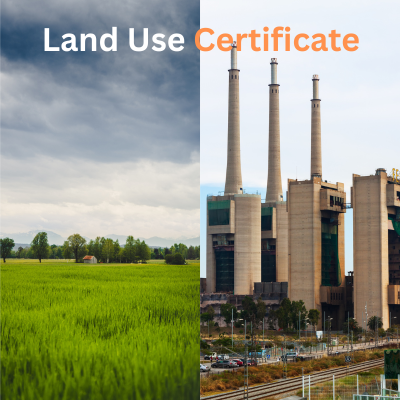
India, a land of vibrant agriculture and burgeoning industry, is constantly evolving. As our economy grows, fertile farmlands often give way to bustling factories, sprawling commercial complexes, or essential infrastructure. This transformation, seemingly straightforward on the surface, involves a complex bureaucratic dance, with one document playing a pivotal, often unsung, role: the Land Use Certificate (LUC), also known as the Change of Land Use (CLU) order in many states.
If you're an entrepreneur eyeing a plot of agricultural land for your next industrial venture, or a farmer considering selling your ancestral land for development, understanding the LUC is not just important – it's absolutely critical.
The simple answer lies in zoning regulations and the very purpose of land classification. Agricultural land is typically designated for farming activities to ensure food security and protect our rural livelihoods. Converting it for non-agricultural purposes without proper authorization can lead to:
This is where the Land Use Certificate steps in, acting as a crucial gatekeeper.
The LUC or CLU is essentially an official permission from the competent government authority (usually the Department of Town and Country Planning, Revenue Department, or District Collectorate) that sanctions the change in the designated use of a piece of land. It's the legal document that officially declares your agricultural land can now be used for industrial, commercial, residential, or any other approved non-agricultural purpose.
To get a Land Use Certificate, you generally need to apply to the local government or municipal authority. The specific department may vary by state, but it's often the Revenue Department, the Town and Country Planning Department, or the District Collector's office. You may be able to apply online through the state's land records website or a single-window portal, or you may need to apply in person.
1. Application Submission
Who applies? The landowner or their authorized representative.
Where? Usually at the District Collector's office, Tehsildar's office, or the Town and Country Planning Department. Many states are now moving towards online application portals, making the process more transparent and accessible (e.g., UP Bhulekh for land records, sometimes linked to CLU applications).
2. Key Documents
This is where preparation is paramount. You'll generally need:
3. Field Verification and Scrutiny
Once the application is submitted, a revenue official (like the Patwari or Kanungo) will conduct a physical inspection of the land to verify its existing use and confirm the details provided in the application.
The application and supporting documents will be scrutinized by various departments to ensure compliance with zoning laws, environmental regulations, and other relevant policies.
4. Public Notice and Objections
In some cases, especially for larger land parcels or significant changes, a public notice may be issued in local newspapers inviting objections from interested parties. This is to ensure transparency and address any potential grievances.
5. Approvals and Sanctions
Based on the verification, scrutiny, and clearance from all concerned departments, the competent authority (often the District Collector or the Town Planner) will issue the Land Use Certificate/CLU order.
This order will specify the new permissible use of the land, any conditions attached (e.g., development charges, infrastructure requirements), and the validity period.
While the LUC is vital, the process can sometimes be riddled with challenges:
If you're considering converting agricultural land for industrial use, the Land Use Certificate is your starting point. It's not just a piece of paper; it's the foundation upon which your entire project will legally stand. Engage with legal experts, conduct thorough due diligence, and be prepared for the documentation and verification process.
By understanding and navigating the CLU effectively, you can transform a fertile farm into a thriving factory, contributing to India's industrial growth while ensuring legal compliance and sustainable development.
To learn more about land use certificate in India, we recommend you to visit Metacorp as it solve legal and compliance issues of new and established businesses.





We are the pioneers in offering environmental consulting services to our patrons, giving us the first mover advantage & keeping us ahead of our competitors.
Very experienced in filing, monitoring & submission of CDSCO Compliances, Drugs Manufacturing & sale guidelines, Environmental Impact Assessment, AERB consulting services, Pollution Control Board CTE & CTO Advisory Services, Waste Management Authorization from State Pollution Control Boards, Fertilizers & Insecticides Manufacturing, Wholesale & Import Compliances
